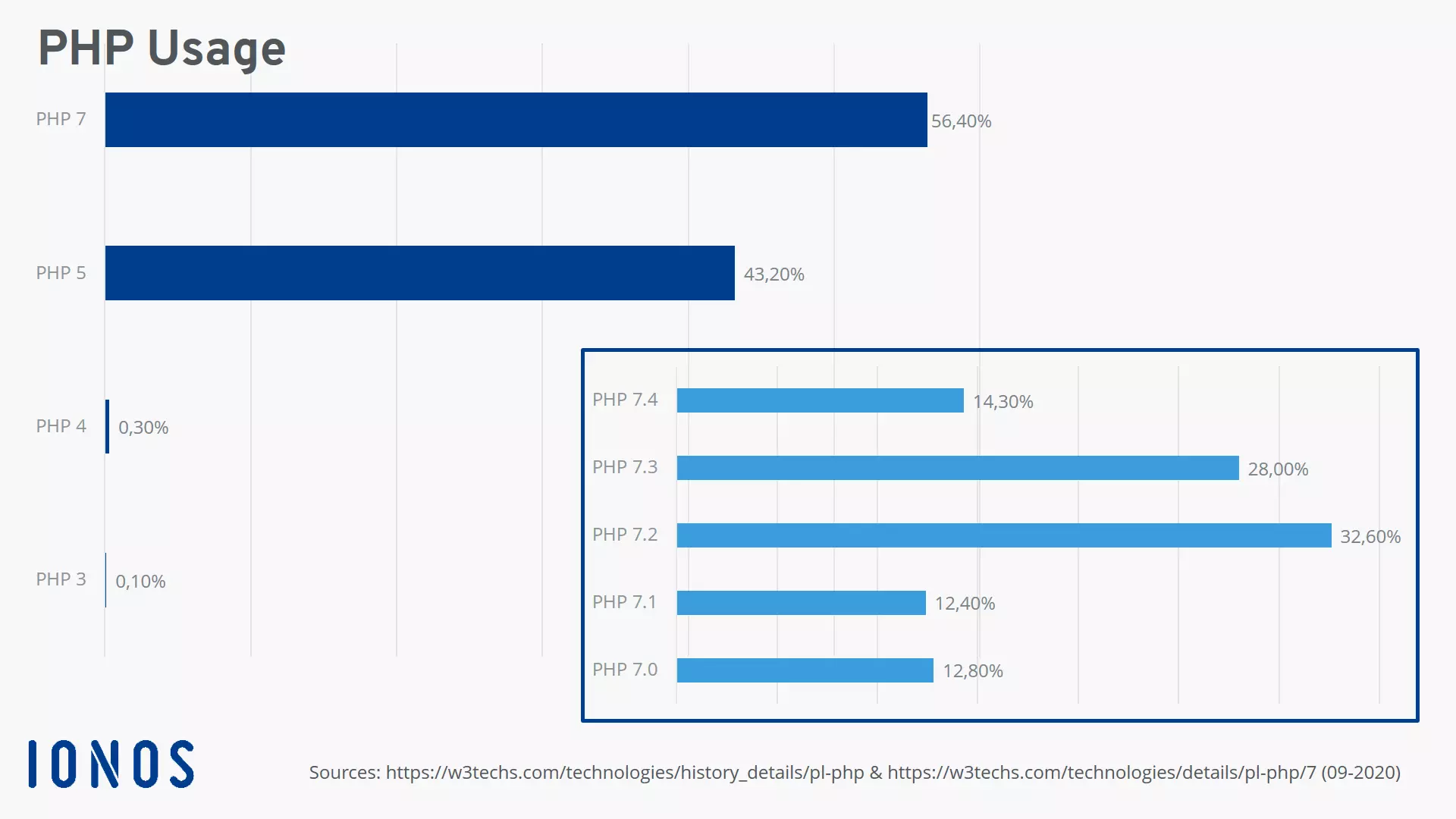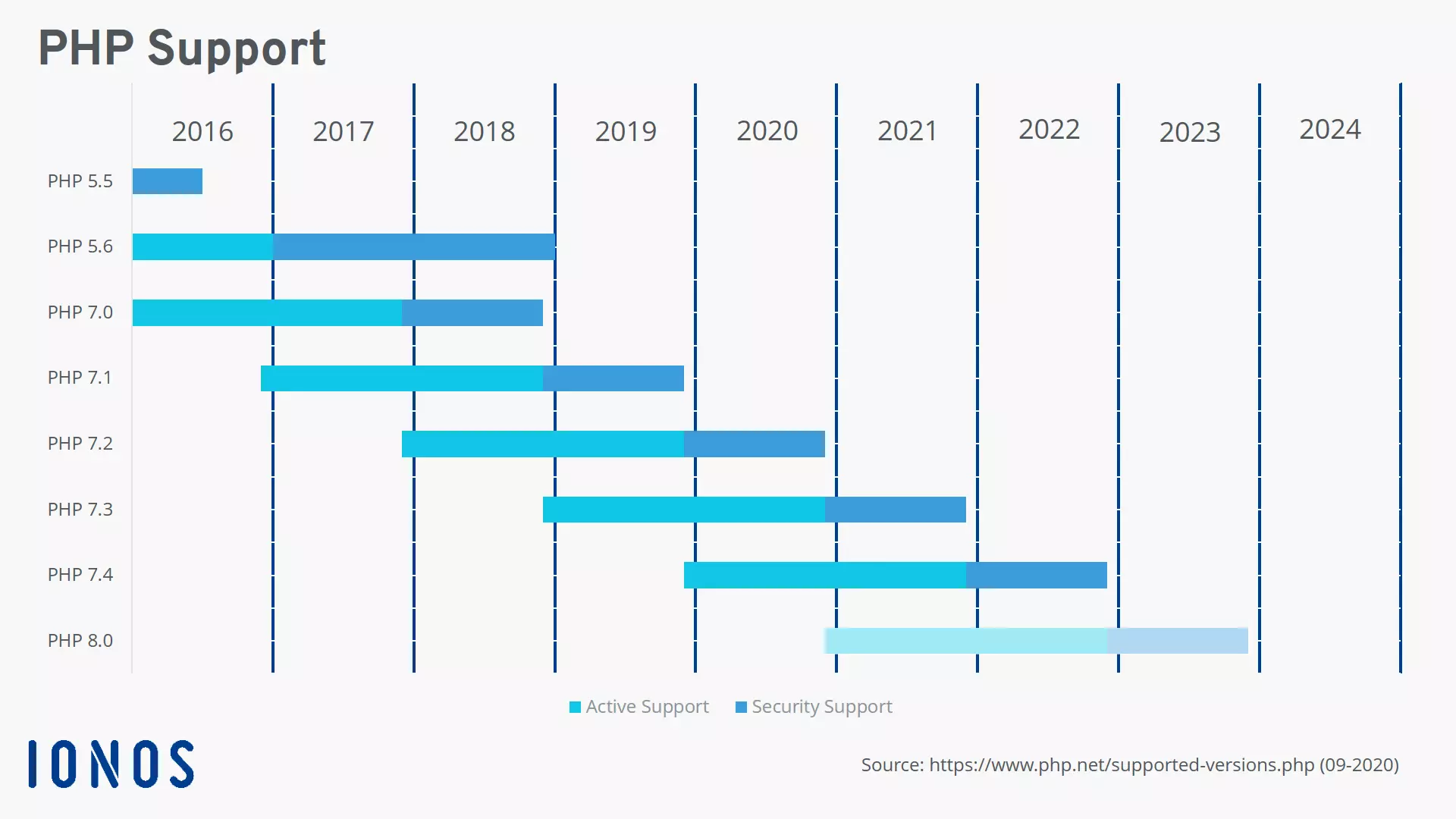PHP 7.2 – end-of-life (EOL) on November 30, 2020
Four of the most popular content management systems (WordPress, TYPO3, Joomla, and Drupal) use PHP. These CMS use the open source scripting language mostly for programming dynamic web content in server-side programming, while other scripting and programming languages such as HTML, CSS, and JavaScript address the web browser (client-side programming).
In autumn 2017, version PHP 7.2 was introduced as the successor to PHP 7.1. On November 30, 2020, this version will reach its official end-of-life (EOL) date and will no longer be supported. Updating to the latest versions is strongly recommended after the final support end date – to ensure that your website continues to have the best possible protection against hackers, to fix bugs, and to optimize the performance of your website. If you’re looking to plan far ahead, you can also use the end-of-life period of PHP 7.2 for a major update to PHP 8. PHP 8 has been announced for the end of the year and promises significant improvements over the PHP 7 versions. If you want to test the compatibility of your site with PHP 8 today, there is a Beta version now available for testing.
PHP 7.2 EOL – what should you do?
Recent PHP distribution statistics show that outdated PHP code is often not updated. Many users apparently shy away from the migration effort and are afraid of technical problems when switching over. A lack of time is another common reason for why many webmasters postpone overdue updates or major version upgrades. Once you’ve lost your connection, however, the effort required to install updates can increase significantly. Basically, the further the gap between two PHP versions, the greater your adaptation efforts will be. In addition, when changing to a new major release, e.g. from version 7 to version 8, additional maintenance work is to be expected.
However, if you don’t keep your system up to date, you should be prepared to deal with the consequences. Technical problems can accumulate, since your database information will no longer be up to date. As a result, the performance of your website will suffer, and this will make it stand out like a sore thumb in comparison to competing offers due to its extended loading times. Ultimately, this can lead to declining visitor numbers.
Outdated PHP code has a particularly negative impact on the safety of web offers. Hackers are always on the lookout for security gaps that are not closed. If you wait very long with PHP updates, these vulnerabilities will undoubtedly accumulate. In effect, you can assume that bugs and security gaps in the PHP versions up to version 7.3.8 will pave the way for arbitrary code execution, third-party programs to be installed, data to be changed, or even data to be deleted.
That’s why you should take updating your web offers seriously, and update to the latest supported version as soon as possible. In light of the PHP 7.2 EOL date, switching to the current version is certainly recommended. PHP 7.4, for example, operates without any compatibility problems with established and popular content management systems such as WordPress, Joomla, or Drupal. Besides the more recent 7 versions, PHP 8 is set to be released shortly for a major update.
Updates are usually associated with additional work and may require technical problems to be solved, as well as finding new solutions and replacing outdated plug-ins. In the long term, however, you’ll benefit from the new features and the performance and security optimizations of the successor versions. However, before going online with updated PHP code, you should carry out tests in a secure offline environment. Any errors and problems incurred can then be solved before the website is accessible to others. If you need additional support, you can contact the plugin manufacturers or reach out to the PHP community.
IONOS offers state-of-the-art PHP web hosting solutions for your projects. Benefit from the latest PHP version to create dynamic websites and reduce access, and loading times.
Release schedule and support deadlines for PHP versions
When selecting future PHP versions, you should keep the release schedule and support deadlines in mind. Towards the end of a year, a new version of the scripting language will be released, which will be actively supported for two years at a time. During this time, the PHP community fixes bugs and security flaws at regular intervals. After this phase, security support is guaranteed for another year, i.e. only particularly critical security gaps are closed. This phase is ideal to prepare for the switch to the new PHP version without having to rush. The end-of-life date (EOL) finally ends the “lifespan” of a PHP version.
In concrete figures, the roadmap for current and future PHP versions (release planning, support deadlines) is as follows:
| PHP 8 | - Major update to PHP 8 (release announced for November 2020) |
|---|---|
| PHP 7.4. | - Release: 28.11.19 - Active support until 28.11.21- Security support until 28.11.22 |
| PHP 7.3 | - Release 06.12.18- Active support until 06.12.20- Security support until 06.12.20 |
| PHP 7.2 | - Release 30.11.17- Active support until 30.11.19- Security support until 30.11.20 |
| Earlier PHP versions | - End of life (EOL), support stops entirely |
Is PHP a topic you haven’t quite gotten to grips with yet? In the control center of your hosting provider, you can quickly find out which PHP version is used for your website. Here, you can also get support for a version change.



